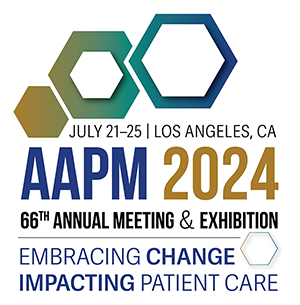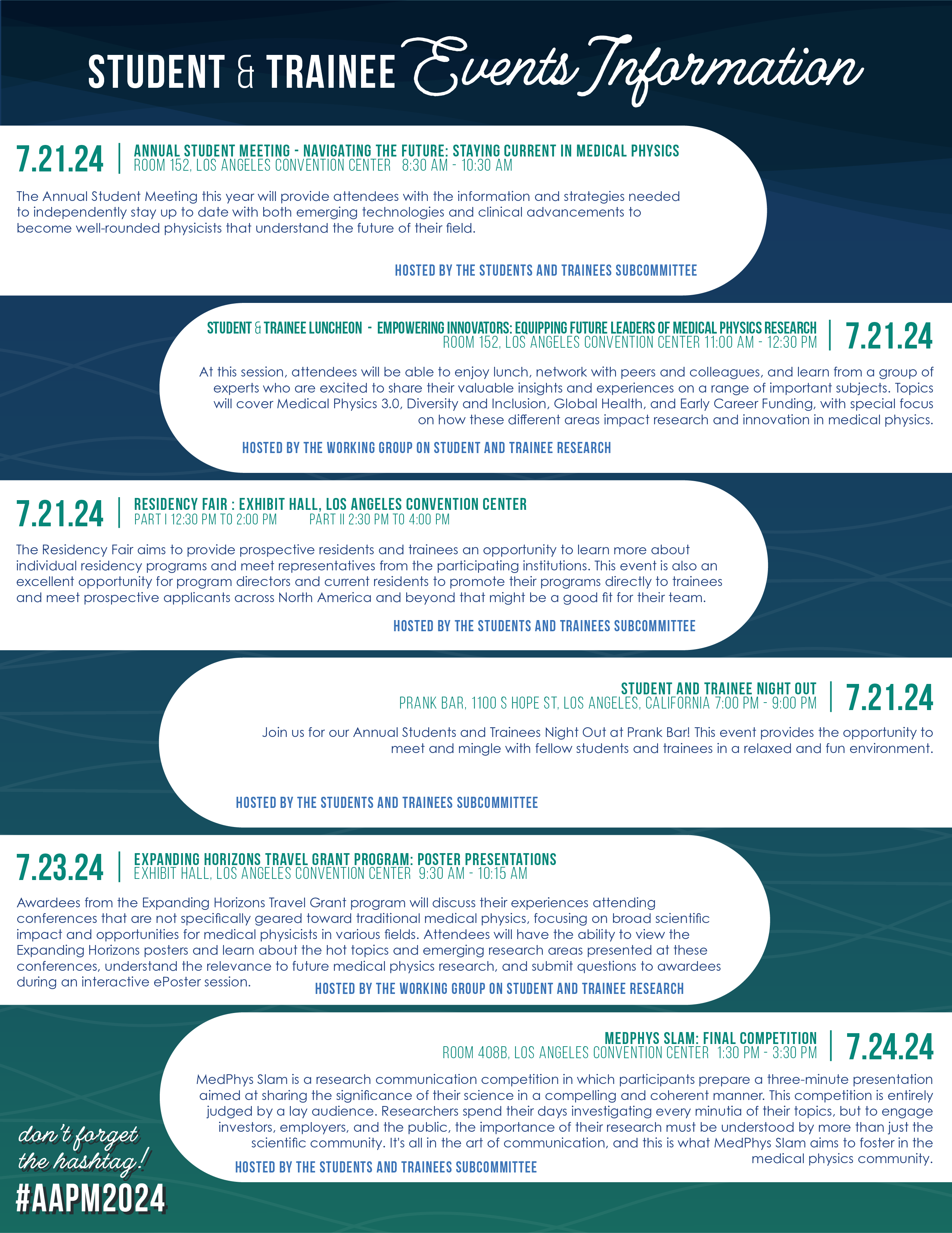Student & Trainee Events
The AAPM Students and Trainees Subcommittee and Working Group on Student and Trainee Research organize special events geared specifically towards students, residents, and post-docs. Participants will be provided a range of environments to interact with peers, expand their network, and learn new skills.
Saturday, July 20, 2024
ACR Reception for Medical Physics Grad Students and Trainees — 5:30 PM - 7:30 PM
Tom's Watch Bar (1011 S Figueroa St)
Hosted by the American College of Radiology (beer, wine, and light appetizers will be provided).
Sunday, July 21, 2024
Annual Student Meeting –Navigating the Future: Staying Current in Medical Physics
Concourse 152, Los Angeles Convention Center — 8:30 AM - 10:30 AM
Hosted by the Students and Trainees Subcommittee
As the field of medical physics advances rapidly towards a new era, it is essential to follow the new advancements, technologies, and research that will shape the near future. With a seemingly overwhelming number of resources available, it is difficult - especially for students and trainees - to know where to get their information, and how to know if it is important. This session will provide attendees with the information and strategies needed to independently stay up to date with both emerging technologies and clinical advancements in order to become well-rounded physicists that understand the future of their field.
Our panel consists of four esteemed speakers: Dr. Bas Raaymakers (University Medical Center Utrecht), Dr. Alejandro Bertolet (Massachusetts General Hospital), Dr. Brian Pogue (University of Wisconsin-Madison), and Dr. Cynthia McCollough (Mayo Clinic). They bring forth a wealth of expertise spanning MR-Linac, radiopharmaceuticals, research methodologies, and photon counting CT detectors. Through their presentations, they will elucidate recent developments in their respective fields and offer practical advice for students seeking to remain current.
To ensure an interactive experience, a Q&A session will follow their presentations to provide students and trainees in the audience with the unique opportunity to foster a deeper understanding of the evolving field of medical physics they are poised to shape.
Student and Trainee Luncheon - Empowering Innovators: Equipping Future Leaders of Medical Physics Research
Concourse 152, Los Angeles Convention Center — 11:00 AM - 12:30 PM
Hosted by the Working Group on Student and Trainee Research
Graduate students, post-doctoral fellows, and residents in the field of medical physics have to navigate a multifaceted environment to be successful in research and development. This includes staying informed about emerging trends and topics, building effective partnerships and collaborations, and developing essential skills such as scientific communication and applying for grants. At this session, attendees will be able to enjoy lunch, network with peers and colleagues, and learn from a group of experts who are excited to share their valuable insights and experiences on a range of important subjects.
Our distinguished speakers will include Dr. Ehsan Samei (Duke University), Dr. Ghada Aldosary (KASCH-MNGHA), Dr. Wilfred Ngwa (Johns Hopkins University), and Dr. Magdalena Bazalova-Carter (University of Victoria). Their presentations will cover Medical Physics 3.0, Diversity and Inclusion, Global Health, and Early Career Funding, respectively, with special focus on how these different areas impact research and innovation in medical physics.
Residency Fair: Part I
Exhibit Hall, Los Angeles Convention Center — 12:30 PM - 2:00 PM
Residency Fair: Part II
Exhibit Hall, Los Angeles Convention Center — 2:30 PM - 4:00 PM
Hosted by the Students and Trainees Subcommittee
The Residency Fair aims to provide prospective residents and trainees an opportunity to learn more about individual residency programs and meet representatives from the participating institutions. This event is also an excellent opportunity for program directors and current residents to promote their programs directly to trainees and meet prospective applicants across North America and beyond that might be a good fit for their team. Trainees can register for the Residency Fair as well as the Residents and Applicants Connect here.
Society of Physics Students Joint Undergraduate Gathering
Room 406AB — 4:30 - 5:30 PM
Hosted by the Society of Physics Students and Working Group for Student and Trainee Research
The Society of Physics Students (SPS) is an organization for undergraduate students interested in physics and is federated with the AAPM under the umbrella of the American Institute of Physics. In this session, we invite you to come and:
(1) Learn about the SPS and its offerings to support your vocation discernment
(2) Learn about how the AAPM can help as well,
(3) Hear from a panel of graduate and resident trainees in medical physics about their paths into the field,
(4) Meet other undergraduate students interested in medical physics, and
(5) Pick up some SPS swag!
Student and Trainee Night Out
Prank Bar, 1100 S Hope St — 7:00 - 9:00 PM
Hosted by the Students and Trainees Subcommittee
Join us for our Annual Students and Trainees Night Out at Prank Bar! This event provides the opportunity to meet and mingle with fellow students and trainees in a relaxed and fun environment.
Monday, July 22, 2024
Residents and Applicants Connect
Exhibit Hall, Los Angeles Convention Center — 9:30 AM - 10:15 AM
Hosted by the Students and Trainees Subcommittee
We are excited to announce the 2nd Annual AAPM 2024 STSC Resident & Prospective Applicants Connect. This event aims to connect students and trainees who plan to apply to medical physics residency programs, including the upcoming Medical Physics Match 2025 cycle, to engage with current residents and other prospective candidates in an informal setting, outside of the regular AAPM Residency Fair hours. Residents can use the form here to register your interest to participate by Friday, July 5th. Trainees can register for this event by filling out the Residency Fair Trainee Registration form above.
Tuesday, July 23, 2024
Expanding Horizons Travel Grant Program: Poster Presentations
Exhibit Hall, Los Angeles Convention Center — 9:30 AM - 10:15 AM
Hosted by the Working Group on Student and Trainee Research
Awardees from the Expanding Horizons Travel Grant program will discuss their experiences attending conferences that are not specifically geared toward traditional medical physics, focusing on broad scientific impact and opportunities for medical physicists in various fields. Attendees will have the ability to view the Expanding Horizons ePosters and learn about the hot topics and emerging research areas presented at these conferences, understand the relevance to future medical physics research, and submit questions to awardees during an interactive ePoster session.
Wednesday, July 24, 2024
Residents and Applicants Connect
Exhibit Hall, Los Angeles Convention Center — 9:30 AM - 10:15 AM
Hosted by the Students and Trainees Subcommittee
We are excited to announce the 2nd Annual AAPM 2024 STSC Resident & Prospective Applicants Connect. This event aims to connect students and trainees who plan to apply to medical physics residency programs, including the upcoming Medical Physics Match 2025 cycle, to engage with current residents and other prospective candidates in an informal setting, outside of the regular AAPM Residency Fair hours. Residents can use the form here to register your interest to participate by Friday, July 5th. Trainees can register for this event by filling out the Residency Fair Trainee Registration form above.
MedPhys Slam: Final Competition
Room 408B, Los Angeles Convention Center — 1:30 PM - 3:30 PM
Hosted by the Students and Trainees Subcommittee
MedPhys Slam is a research communication competition in which participants prepare a three-minute presentation aimed at sharing the significance of their science in a compelling and coherent manner. This competition is entirely judged by a lay audience. Researchers spend their days investigating every minutia of their topics, but to engage investors, employers, and the general public, the importance of their research must be understood by more than just the scientific community. It's all in the art of communication, and this is what MedPhys Slam aims to foster in the medical physics community.
This competition is open to all student, resident, and junior members of the AAPM. The preliminary competitions will take place at the local chapter meetings throughout the year, and those winners will participate in the final competition at the AAPM [year] Annual Meeting. The rules are simple: participants have three minutes to present their research using a maximum of three PowerPoint slides. Participants will be judged on three equally weighted categories: comprehension and content, communication, and engagement. Not only will this be of interest to those within medical physics, it can be expanded as an AAPM media initiative aimed at communicating what we do to the public.



